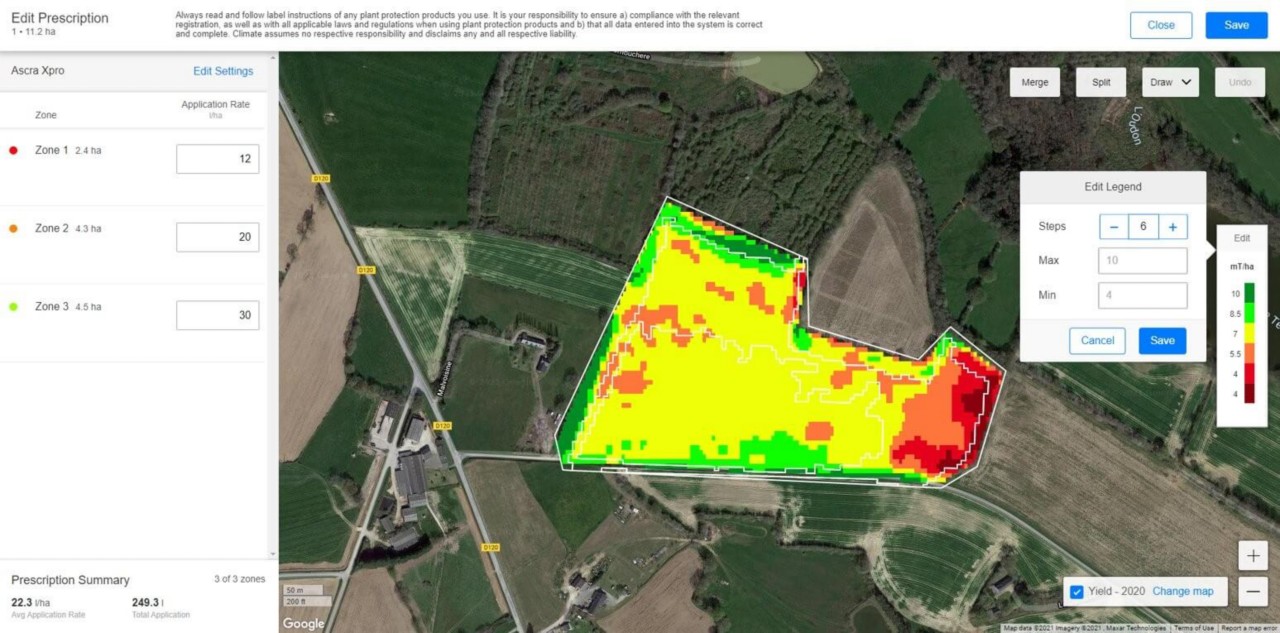At Climate FieldView™, we place effectivity and profitability at the forefront of everything we do and are continuously developing new technologies to assist you in farming more sustainably. With the launch of Climate FieldView’s new scripting feature, we are solidifying FieldView’s position as a global leading platform, committed to helping farmers address recent and future challenges in agriculture.
We have recently expanded on the capabilities of our scripting tool, in our first year we provided our growers with a manual scripting tool where the grower could draw his own zones as well as use existing scripts to merge/split and define zones per field. This new scripting tool allows for auto-zoning based on any FHA (Field Health Advisory) satellite scouting map to auto-generate the zones based on our unique algorithm. The auto-zoning feature is now only available for satellite imagery but will soon be expanded to yield maps for seed scripting.
The automated generation of scripting zones for fertility not only saves valuable time, but also optimizes the effective application of fertilizer inputs. This feature helps farmers boost the use of high-priced inputs like nitrogen to ultimately increase their return on investment and maximize the benefits that come from using high-quality products and technology.
When examining a field, inherent differences in soil types, water retention abilities, fertility, soil depth etc. all contribute to defining soil potential. South Africa is well-known for its varying soil types and for soil differences that can often be found within the scope of a few meters. These soil differences must be considered when calculating your investment in a specific field. In this regard scripting and variable-rate application play a key role.

Companies offering scripting today base their scripts on soil chemical and physical data from one- or two-hectare grid samples analyzed and zoned to showcase corrections required for pH, phosphate, and potassium. FieldView, however, makes use of satellite imagery and along with our proprietary algorithm to provide a 5 m x 5 m zoned grid to calculate statistically and output the biomass index and accumulation from week to week in the scouting map feature. When using these maps in the universal scripting tool, the grower can decide on the number of zones he/she wants to manage, and this tool will automatically generate zones based on the statistical differences between biomass areas in the field. Scripting based on the Field Health Advisory (scouting maps) can be used to zone fields for variable rate application in fertilizer like nitrogen. A grower can benefit by applying nitrogen at variable-rate according to soil texture and available moisture.
Not only does this feature save a lot of time as zones are now automated rather than drawn manually, but it is also much more accurate. It allows farmers to make an accurate calculation of their inputs to generate the maximum return on investment.
Furthermore, we added the capability to create CP scripts as a tank mix, previously growers could only make a tank mix consisting of a fungicide, insecticide, or herbicide (given that normally farmers mix at least two products – e.g., fungicide and insecticide or herbicide and insecticide), ease the application execution and tracking processes enabling the creation of clear application reports, useful for residues’ compliance and certification. This enhancement to allow for tank mixtures in CP scripting capability and in Cab app provides the ability to enter up to four different product types (herbicide, insecticide, fungicide, plant growth regulator) per tank mix, with a maximum of eight different CP products allowing flexibility and data consistency.
How do I access this feature?
1. Visit www.climatefieldview.co.za.
2. Enter your username and password.
3. Click on the button at the top of the account called “Prescription”.
4. This will take you to the scripting tool.
This new feature has now been launched globally and is available to all FieldView™ Plus users.
For more information on this feature, please contact Hugo le Roux at hugo.leroux@bayer.com or Hanri de Jonge at hanri.dejonge@bayer.com.